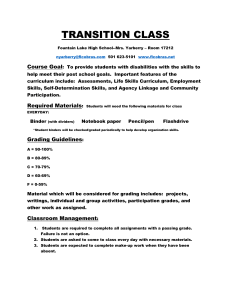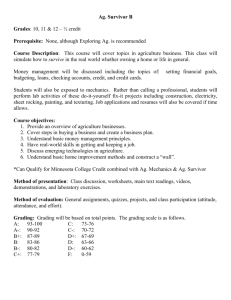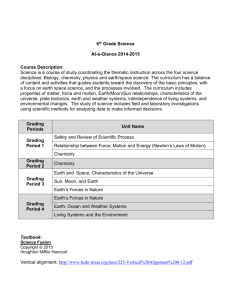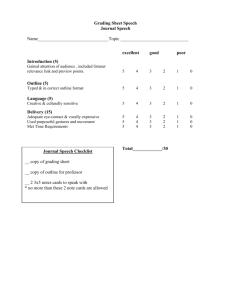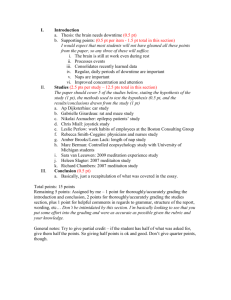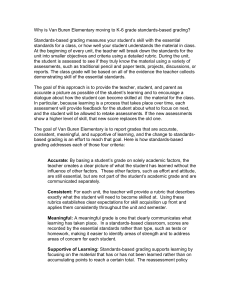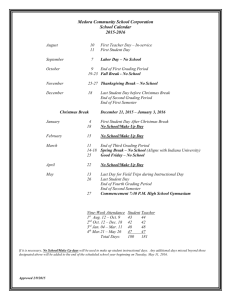Instructional Coach Training Feedback with Deb Pickering
advertisement
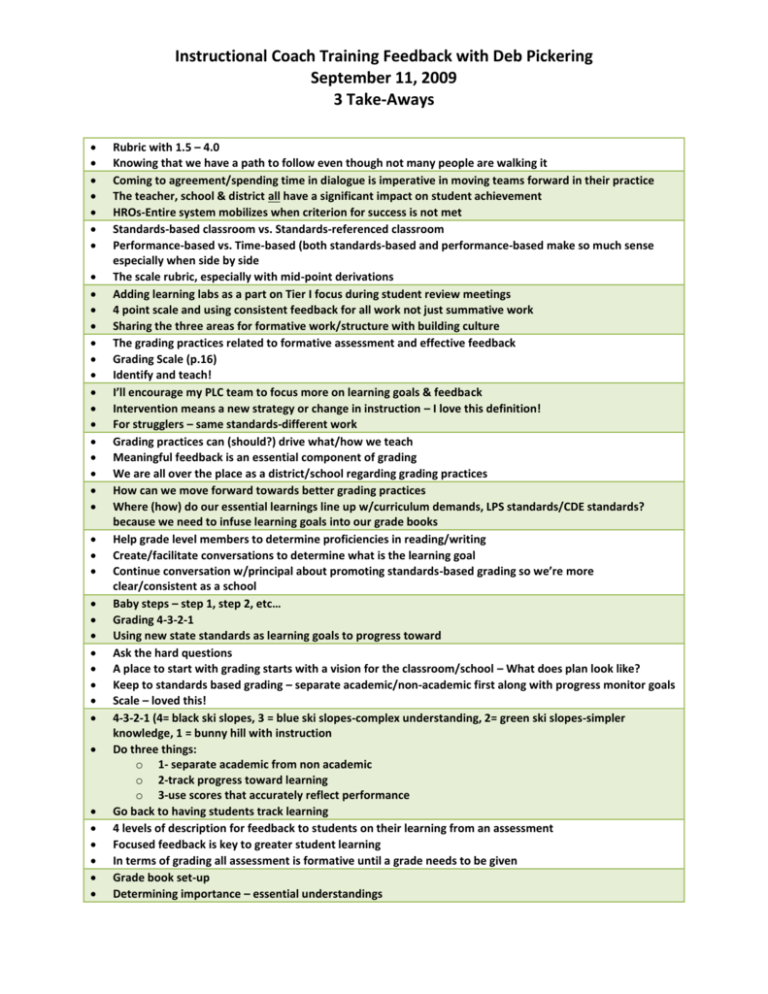
Instructional Coach Training Feedback with Deb Pickering September 11, 2009 3 Take-Aways Rubric with 1.5 – 4.0 Knowing that we have a path to follow even though not many people are walking it Coming to agreement/spending time in dialogue is imperative in moving teams forward in their practice The teacher, school & district all have a significant impact on student achievement HROs-Entire system mobilizes when criterion for success is not met Standards-based classroom vs. Standards-referenced classroom Performance-based vs. Time-based (both standards-based and performance-based make so much sense especially when side by side The scale rubric, especially with mid-point derivations Adding learning labs as a part on Tier I focus during student review meetings 4 point scale and using consistent feedback for all work not just summative work Sharing the three areas for formative work/structure with building culture The grading practices related to formative assessment and effective feedback Grading Scale (p.16) Identify and teach! I’ll encourage my PLC team to focus more on learning goals & feedback Intervention means a new strategy or change in instruction – I love this definition! For strugglers – same standards-different work Grading practices can (should?) drive what/how we teach Meaningful feedback is an essential component of grading We are all over the place as a district/school regarding grading practices How can we move forward towards better grading practices Where (how) do our essential learnings line up w/curriculum demands, LPS standards/CDE standards? because we need to infuse learning goals into our grade books Help grade level members to determine proficiencies in reading/writing Create/facilitate conversations to determine what is the learning goal Continue conversation w/principal about promoting standards-based grading so we’re more clear/consistent as a school Baby steps – step 1, step 2, etc… Grading 4-3-2-1 Using new state standards as learning goals to progress toward Ask the hard questions A place to start with grading starts with a vision for the classroom/school – What does plan look like? Keep to standards based grading – separate academic/non-academic first along with progress monitor goals Scale – loved this! 4-3-2-1 (4= black ski slopes, 3 = blue ski slopes-complex understanding, 2= green ski slopes-simpler knowledge, 1 = bunny hill with instruction Do three things: o 1- separate academic from non academic o 2-track progress toward learning o 3-use scores that accurately reflect performance Go back to having students track learning 4 levels of description for feedback to students on their learning from an assessment Focused feedback is key to greater student learning In terms of grading all assessment is formative until a grade needs to be given Grade book set-up Determining importance – essential understandings Grading practices & consistencies through school! and district To ensure staff are tracking learning goals and not assignments The clearer picture of “standards-based” Grading practices related to formative assessment: o separate academic from non-academic o track progress towards learning goals o use scores that reflect performance Rubric for determining grade level determination Relationship of site-based management and student achievement The need for a review of grading practices now that teachers have tried it for awhile Encourage teachers to reflect on their grading practices and if it is representative of what students know Be transparent with students and parents I really wish we had more conversations about PLC/formative assessments (this was the last 30 minuteswish is had been 3 hours Informing teachers that tracking student progress has to be meaningful and purposeful towards learning goal Grades need to be informative and academics separate from non academic We have a huge job to change and shift teachers thinking on this This conversation today gave me lots to consider. I have formed some responses, guidelines, suggestions I can take back to my building and staff. Big ideas that I’m leaving with today The student’s ability to progress, or not is much about FEEDBACK Accurate grading is about appropriate ASSESSMENT When looking at what to track from standards/curriculum, think in terms of TOPICS Changing my thinking about partial proficiency – Its about what students KNOW and not what they don’t know Keep a “standards” focus while working with teachers who struggle through multiple rubrics to try to give an overall grade. Take them back to the point of “student learning “importance. Remind folks that the mission is to make sure kids learn as much as they can in 180 days. Lots of learning today – I just need to process it all Summative scores are a snapshot @ that point in time Grading with the 4, 3.5, 3, 2.5, 2, 1 type scale Importance of clarity of purpose, feedback, learning goals, assessment Standards-need to develop understanding among teachers Create learning opportunities for all staff Need for district/school level accountability “Only way to get better is to change something – cuz we can’t work any harder” I need to follow through with the instructional practices cadre Good to return to some “old topics” that haven’t always stayed at the forefront at our discussions The 4-3-2-1-0 scale at the top of page 16 Debra’s example of “what is 90%?” when she pointed to 2 different sizes of water bottles – both were 905 but the amounts were different (great example) Wonderful speaker – so knowledgeable We continue to talk about separating academic & non-academic factors – lets keep this idea moving forward One of Debra’s slides talks about students giving feedback to teachers – I like that! I like the wording of Deb’s rubrics and using .5’s The importance of feedback The importance of separating the non-academic from the academic I can’t wait to start conversations on the grading scale and looking at learning goals Keep pushing for baby steps in teacher thinking Instructional Coach Training Feedback with Deb Pickering September 11, 2009 3 Take-Aways Continue to work on guiding PLC teams in proper use of formative assessments Keep thinking – Glass half full! We’ve been making progress.
